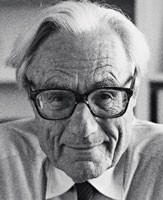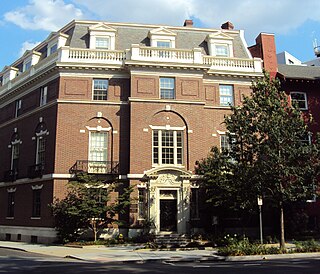
Wadi Salib is a primarily Palestinian neighbourhood located in downtown Haifa, Israel, on the lower northeastern slope of Mount Carmel, between the Hadar HaCarmel and the city's historic center and CBD.
Bucerius Law School is a private law school located in Hamburg, Germany. The school was the first private school to teach law in Germany.

The charitable foundation Zeit-Stiftung Ebelin und Gerd Bucerius is registered in Hamburg. Its aim is to fund projects in research and scholarship, arts and culture, as well as education and training. It was founded in 1971 by Gerd Bucerius and carries the name of the founder, the title of the weekly newspaper Die Zeit, which he co-founded, and the nickname of his second wife, Gertrud Ebel, Ebelin.

The Leo Baeck Institute, established in 1955, is an international research institute with centres in New York City, London, Jerusalem and Berlin, that are devoted to the study of the history and culture of German-speaking Jewry. The institute was founded in 1955 by a consortium of influential Jewish scholars including Hannah Arendt, Martin Buber and Gershom Scholem. The Leo Baeck Medal has been awarded since 1978 to those who have helped preserve the spirit of German-speaking Jewry in culture, academia, politics, and philanthropy.

Gerd Bucerius was a German politician, publisher and journalist, one of the founding members of Die Zeit. He is the namesake of the Bucerius Law School in Hamburg and of the Bucerius Kunst Forum, an art gallery.
The Encyclopaedia Aethiopica (EAe) is a basic English-language encyclopaedia for Ethiopian and Eritrean studies. The Encyclopaedia Aethiopica provides information in all fields of the discipline, i.e. anthropology, archaeology, ethnology, history, geography, languages and literatures, art, religion, culture and basic data. Although the main audience is academic, most articles are readable also for non-specialists. The EAe is illustrated with maps and photographs. It employs an in-house form of romanization of Geʽez, Amharic, and other languages, which varies greatly from standard formats, such as BGN/PCGN: the emperor Menelek II's name, for example, is written as "Mənilək II". Nevertheless, the EAe romanization scheme is used extensively throughout modern Ethiopic scholarship.

The University of Haifa is a public research university located on Mount Carmel in Haifa, Israel. Founded in 1963, the University of Haifa received full academic accreditation in 1972, becoming Israel's sixth academic institution and the fourth university. The university has the largest university library in Israel. As of 2019, approximately 18,000 students were enrolled at the University of Haifa. Among Israeli higher education institutions the University of Haifa has the largest percentage (41%) of Arab-Israeli students.

Deborah Hertz is an American historian whose specialties are modern German history, modern Jewish history and modern European women's history. Her current research focuses on the history of radical Jewish women.

Manfred Lahnstein is a German politician of the Social Democratic Party (SPD). In 1982 he was German Federal Minister of Finance as well as Federal Minister of Economics and until 2004 worked for the media conglomerate Bertelsmann.

The Bucerius Kunst Forum is an international exhibition centre in Hamburg, Germany, founded in 2002 through the ZEIT-Stiftung Ebelin und Gerd Bucerius foundation. It is named after Gerd Bucerius and his wife, and located directly beside the Hamburg Rathaus. The exhibition centre shows 3 - 4 exhibitions per year, in co-operation with other museums and collections. The exhibition centre participates in the Long Night of Museums.
Gilad Margalit was an Israeli historian, writer, and professor in the Department of General History at the University of Haifa.

The Leo Baeck Institute New York (LBI) is a research institute in New York City dedicated to the study of German-Jewish history and culture, founded in 1955. It is one of three independent research centers founded by a group of German-speaking Jewish émigrés at a conference in Jerusalem in 1955. The other Leo Baeck institutes are Leo Baeck Institute Jerusalem and Leo Baeck Institute London, and the activities of all three are coordinated by the board of directors of the Leo Baeck Institute. It is also a founding partner of the Center for Jewish History, and maintains a research library and archive in New York City that contains a significant collection of source material relating to the history of German-speaking Jewry, from its origins to the Holocaust, and continuing to the present day. The Leo Baeck Medal has been awarded by the institute since 1978 to those who have helped preserve the spirit of German-speaking Jewry in culture, academia, politics, and philanthropy.
Michael Brenner is a German historian who researches and publishes on the history of Jews and Israel. Brenner has authored eight books on Jewish history, which were translated into twelve languages and is the editor and co-editor of eighteen books. He holds teaching positions at both the Ludwig Maximilian University of Munich and the American University.
The Leo Baeck Institute London is a research institute dedicated to the study of German-Jewish history, politics and culture, founded in 1955. It belongs to the international Leo Baeck Institute with further research centres in New York City, Berlin and Jerusalem.

The German Historical Institute Washington DC is an institute of historical study based in Washington, D.C. It has been part of the Max Weber Foundation: German Humanities Institutes Abroad since 2002. The director is Simone Lässig.
Miriam Rürup is a German historian and director of the Moses Mendelssohn Zentrum in Potsdam (Germany).

Sabine Kunst is a German engineer, academic and politician who has been serving as chairwoman of the Joachim Herz Foundation since 2022.
The Haifa Center for German and European Studies (HCGES) is a joint project of the University of Haifa and the German Academic Exchange Service (DAAD). The Center was founded in 2007 and opened in June 2008 by the Federal Foreign Minister Frank Walter Steinmeier. It is part of the [ Research Authority of the University of Haifa cooperating with the faculties of humanities, social sciences and law. The founding idea of the Center is to provide students, research, academics and the general public with information about modern Germany and Europe. Therefore the Center is holding public events as well as academic conferences and workshops. It also conducts its own interdisciplinary research with a focus on social, political, legal, economic and cultural developments in Germany and Europe after 1945. The HCGES is part of the global network of DAAD Centers for German and European Studies.
Free Media Awards is the press prizes awarded by the two foundations The Fritt Ord Foundation and the ZEIT-Stiftung.
Monika Schwarz-Friesel is a German cognitive scientist, professor at Technische Universität Berlin and one of Europe's most distinguished antisemitism researchers according to Marc Neugröschel from the newspaper The Times of Israel. She is often interviewed by media outlets like Haaretz, Der Standard or Der Tagesspiegel on her research on current forms of antisemitism, which often take place on the internet.










